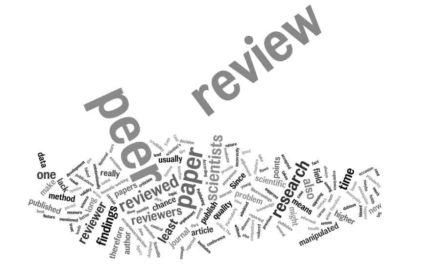Introduction
Peer reviewing is a fundamental component of academic and scholarly publishing. It serves as a quality control mechanism, ensuring that research papers meet established standards before being published. While researchers often focus on submitting their own work for publication, participating in peer review offers numerous benefits, both for personal development and for the advancement of knowledge within a field.
This article explores the benefits of peer reviewing, outlines key skills needed, and provides practical guidance on how to get started in the peer review process.
The Importance of Peer Reviewing
Peer reviewing plays a crucial role in academia by ensuring the credibility and rigor of published research. The process involves evaluating manuscripts submitted to journals, conferences, or grant organizations. Peer reviewers assess the validity, originality, and clarity of a study, providing constructive feedback to authors and editors.
Key functions of peer review include:
- Maintaining Research Quality – Ensures that only high-quality, well-supported studies are published.
- Validating Findings – Helps verify the accuracy and reliability of research before it reaches a wider audience.
- Encouraging Constructive Criticism – Provides authors with feedback to refine and improve their work.
- Fostering Academic Collaboration – Engages researchers in scholarly discussions and advancements within their field.
- Preventing Plagiarism and Misconduct – Identifies issues related to originality, ethical concerns, and flawed methodologies.
The Benefits of Peer Reviewing
While the primary goal of peer reviewing is to improve academic research, reviewers themselves gain valuable benefits from participating in the process.
1. Enhances Research and Writing Skills
- Reviewing manuscripts exposes researchers to diverse writing styles, methodologies, and study designs.
- Evaluating papers critically strengthens analytical thinking and attention to detail.
- Exposure to cutting-edge research keeps reviewers updated on recent advancements in their field.
2. Improves Critical Thinking
- Reviewers learn to assess arguments, methodologies, and conclusions rigorously.
- Analyzing strengths and weaknesses in others’ work enhances one’s ability to evaluate their own research objectively.
- Constructive critiques develop logical reasoning and problem-solving skills.
3. Builds Professional Reputation and Networking Opportunities
- Reviewing for reputable journals establishes credibility and recognition within a discipline.
- Engaging with journal editors and fellow reviewers fosters professional relationships.
- Opportunities to collaborate with researchers and authors emerge through discussions and feedback exchanges.
4. Increases Familiarity with the Peer Review Process
- Reviewing exposes researchers to the evaluation criteria used by academic journals.
- Understanding how papers are assessed improves one’s ability to craft stronger submissions for publication.
- Reviewers develop insights into journal expectations, improving their chances of publishing successfully.
5. Contributes to the Advancement of Science and Academia
- By ensuring research quality, reviewers help maintain the integrity of academic literature.
- Identifying methodological flaws and suggesting improvements leads to better studies and discoveries.
- Reviewers play a vital role in shaping future research and guiding scholarly discussions.
6. Provides Early Access to New Research
- Reviewers often read cutting-edge studies before they are publicly available.
- Exposure to new theories, methodologies, and findings helps reviewers stay at the forefront of their field.
Where to Begin: Getting Started with Peer Reviewing
While experienced researchers and established academics frequently receive invitations to review, early-career researchers and graduate students can also begin engaging in the process by taking proactive steps.
1. Build Expertise in a Specific Research Area
- Developing expertise in a field makes one a valuable reviewer.
- Publishing in peer-reviewed journals increases credibility and makes invitations more likely.
- Attending academic conferences and engaging with the research community helps establish subject matter authority.
2. Join Reviewer Databases and Journal Platforms
- Many academic journals allow researchers to sign up as potential reviewers.
- Platforms such as Publons, Elsevier Reviewer Hub, and Web of Science Reviewer Recognition offer opportunities to join reviewer databases.
- Contacting journal editors directly and expressing interest in reviewing can also be effective.
3. Seek Mentorship from Experienced Reviewers
- Working alongside an experienced reviewer provides insights into best practices.
- Asking a research advisor or professor for guidance can be beneficial.
- Some journals offer reviewer training programs for beginners.
4. Start with Conference Paper Reviewing
- Many academic conferences invite early-career researchers to review submitted abstracts and papers.
- Reviewing for conferences helps develop critical assessment skills before moving on to journal peer review.
5. Engage in Informal Peer Review within Research Groups
- Providing feedback on colleagues’ or fellow students’ papers hones reviewing abilities.
- University research groups often facilitate informal peer review sessions.
6. Take Online Courses on Peer Review
- Organizations such as COPE (Committee on Publication Ethics) and Springer Nature offer peer review training.
- Courses from academic publishers and research institutions provide structured guidance on best practices.
How to Write a Constructive Peer Review Report
Once accepted as a reviewer, it is important to provide clear, constructive, and professional feedback. A well-structured peer review report typically includes the following sections:
- Summary of the Manuscript – A brief overview of the study, its objectives, and key findings.
- Strengths of the Paper – Highlighting the strong aspects of the research.
- Major Concerns and Recommendations – Addressing critical flaws, methodological issues, or areas that need significant improvement.
- Minor Issues and Suggestions – Providing feedback on clarity, formatting, grammar, or citation inconsistencies.
- Final Recommendation – Suggesting whether the paper should be accepted, revised, or rejected.
Common Pitfalls to Avoid in Peer Reviewing
- Being Overly Harsh or Dismissive – Critiques should be constructive rather than overly critical or negative.
- Focusing Solely on Grammar or Formatting – While clarity matters, the focus should remain on content and methodology.
- Bias and Conflict of Interest – Reviewers should disclose conflicts of interest and avoid personal biases.
- Not Providing Actionable Feedback – Authors should be given specific suggestions on how to improve their work.
- Ignoring Journal Guidelines – Following the journal’s specific review criteria ensures a relevant and useful review.
Conclusion
Engaging in peer reviewing offers numerous advantages, from professional development to contributing to academic integrity. By improving critical thinking, expanding research knowledge, and enhancing writing skills, peer reviewers gain valuable expertise that benefits their own scholarly work. For early-career researchers looking to begin peer reviewing, participating in conference reviews, joining journal databases, and seeking mentorship are excellent first steps. By following best practices and providing constructive, well-structured feedback, peer reviewers play a vital role in shaping the quality and future direction of academic research.














